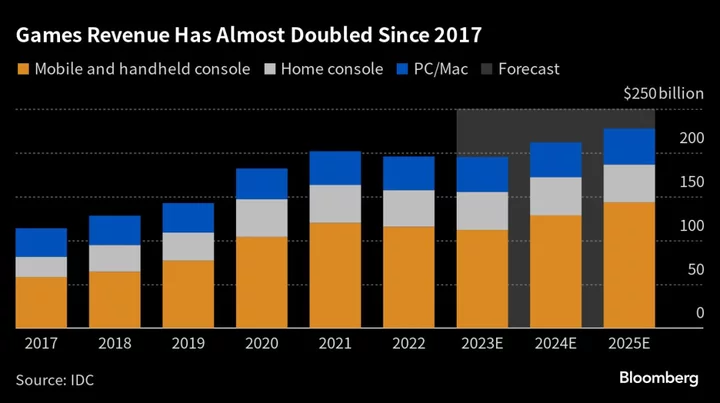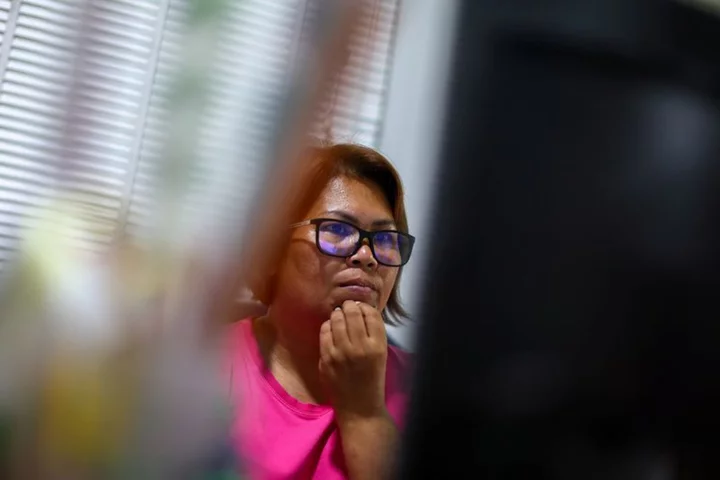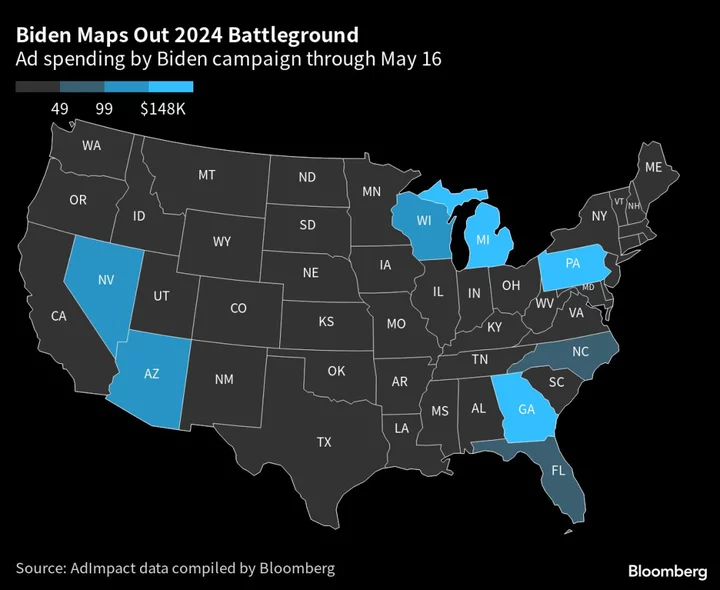Executives and politicians across the world worry about the havoc that next-generation artificial intelligence will wreak on industries from finance to health-care. For the $200 billion games sector, the revolution has already begun.
From San Francisco to Tokyo and Hong Kong, the plethora of companies that power the digital entertainment sphere are responding to decades of escalating costs and stagnant prices by feverishly adopting and developing new AI tools. Hundreds of thousands of jobs are on the line. Yet company leaders and studio chiefs told Bloomberg News that the changes, while inevitable and painful, can empower smaller studios, boost creativity and ultimately benefit gamers around the world.
The head of one major Japanese studio is preparing for a future where half his company’s programmers and designers will be unnecessary within five years. At Hong Kong-listed Gala Sports, executives have mothballed non-AI research projects, forced department heads to study machine learning and offered bounties of as much as $7,000 for novel AI ideas. They worry they might already be late.
“Basically every week, we feel that we are going to be eliminated,” Gala Technology Holding Ltd. 36-year-old Chief Executive Officer Jia Xiaodong told Bloomberg News. “The impact of AI on the game industry in the past three to four months may be as dramatic as the changes in the past thirty or forty years.”
The video game industry is among the first to feel the full brunt of AI because it’s largely digital — encoded in an AI-readable language and created by software engineers well prepared to use, adapt and improve new computing tools. Before OpenAI took the world by storm with ChatGPT in November, it used Valve Corp.’s Dota 2 as a proving ground for its bots.
The advent of AI offers the industry a rare chance to overhaul a business model that in some cases has grown bloated and formulaic — not dissimilar to criticisms directed at risk-averse Hollywood today. Game production costs have spiraled upward faster than sales, with recent blockbusters The Last of Us Part II and Horizon Forbidden West reportedly costing Sony Group Corp. more than $200 million each and requiring years of work from hundreds of staff. The investment of money and time for such projects can be sliced in half by AI, according to UBS Securities analyst Kenji Fukuyama.
“Nothing can reverse, stop, or slow the current AI trend,” said Masaaki Fukuda, who helped build PlayStation Network while at Sony. Now a vice president at Japan’s largest AI startup, Preferred Networks Inc., 48-year-old Fukuda sees a tidal wave of change in how digital content is created and his company has gotten involved with an anime creator named Crypko.
Character illustrations that typically cost upward of ¥100,000 ($720) each to outsource can be obtained from Crypko for a flat monthly fee of ¥4,980 and a commercial license of ¥980 per image. It still needs human artists to finish the AI’s work, but the company’s improving the tool daily and should be able to solve most imperfections within a few years, Fukuda said.
The scale of demand for such content has ballooned over the years, with mobile games that used to cost around ¥40 million to produce 15 years ago now requiring a minimum of ¥500 million, mostly because of graphics, according to former Touken Ranbu producer Yuta Hanazawa.
For the 25-year industry veteran, the new tech was compelling enough to start a new company, AI Works Inc., to sell machine-drawn game illustrations. Like Crypko, it needs a human hand to finalize the product but is much faster and cheaper than hiring an artist. The company’s already provided art for several unannounced projects, charging half the usual industry price, he said.
“AI is the game changer I’ve been waiting for,” 48-year-old Hanazawa said. By freeing developers from the burden of mass-producing graphics, it promises to revitalize the entire industry. “Publishers will be able to take more risks, creators can become creative again, and users as a result can choose from a much wider variety of games.”
AI is also becoming a powerful in-house tool. Gala Sports used publicly available AI services — image generators Stable Diffusion and Midjourney — to build internal toolkits for rendering realistic 3D head models, slashing the cost of a task that previously would take two weeks and as much as 200,000 yuan ($28,000) when outsourced. Now it takes only half a day’s labor. The company has a team dedicated to building further tools to help with coding, design and even customer service.
The downside to all this automation is a corresponding loss of jobs. Industry executives, declining to speak publicly on the matter, expect swathes of workers to lose their jobs as they know them. “AI might eventually wipe out entire job categories in gaming such as quality control, debugging, customer support or translation,” said industry analyst Serkan Toto.
That future was put on display this month when Tokyo-based Morikatron Inc. showed off an entire game made by AI. Murder mystery simulator Red Ram uses Stable Diffusion and ChatGPT to generate its content based on a player’s prompts. “This is a game that would be impossible to develop without AI’s power, because you’d need an infinite amount of art and text assets,” company founder Yukihito Morikawa said. Four engineers took three months to assemble it.
Tsubasa Himeno, a voice actor with many game credits to her name, said the new technology will make it more difficult for young people to get a start in the business. “AI is a pure threat,” she said.
Jiro Ishii, known for creating the live-action novel 428: Shibuya Scramble, in a decade or two expects everyone will be able to create their own games. That’s a threat to the “freemium” model adopted by the likes of Dota 2 and Epic’s Fortnite, which are free to play but charge for in-game cosmetics and extras.
Most see opportunity. Yosuke Shiokawa has operated on both ends of the spectrum, as a former producer of Sony’s hit smartphone game Fate/Grand Order as well as founder of two-year-old Fahrenheit 213 Inc. He started dabbling with AI creation for a video trailer before using it as an aid to create in-game objects and backgrounds, adding extras his four-person team previously wouldn’t have thought to try due to limited resources.
“Soon, it will be a matter of your creativity, not your budget, that determines the value of games,” Shiokawa said.
--With assistance from Yuki Furukawa and Mayumi Negishi.









